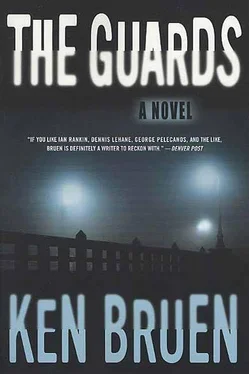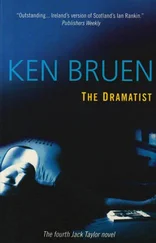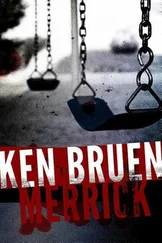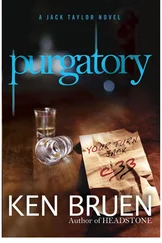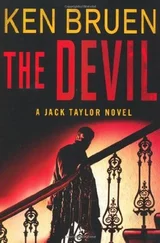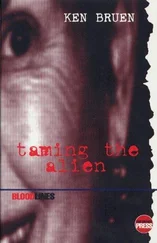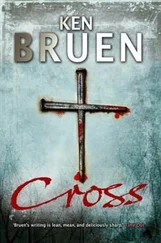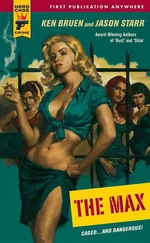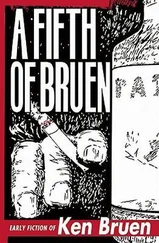poetry
philosophy
and the hook
American crime novels.
I’d now become a bibliophile in the true sense of the word. Not only did I love to read, I loved the actual books. Had learnt to appreciate the smell, the binding, the print, the actual feel of the volumes.
My father had built me a large bookcase, and I’d learnt to line the books alphabetically and according to category.
I was also running wild. Playing hurling, drinking cider, barely attending school. But back home, I’d gaze at my library with a glow in my heart.
Because I loved the look and feel of a volume, I’d begin to read it. That’s how I started to find poetry. I was never to find it in my life, but it was always within reach.
Not a fucking word of this was I saying to another human being. Mention poetry in our street and you’d lose your balls.
My father frequently stood in front of the growing collection, would say,
“Kenny’s themselves would be proud of it.”
My mother, disgusted, had her party piece.
“Filling his head with mad notions. I’d like to try telling the rent man he can have some poems.”
My father would give me a look and I’d mouth silently,
“She means well.”
Later, I’d lie in bed, hear her rant,
“And I suppose you’ll tell me we can eat books. I’d like to see them buy a loaf of bread.”
In fact, she did get her wish. My first day away at Temple-more, she sold them and used the bookcase for the fire.
Tommy Kennedy had forecast great things for me. Dreamed I’d even go to college. My exam results barely got me accepted as a guard. When I told Tommy my career choice, he put his head in his hands, said,
“What a crying shame.”
The night before I left, I met him in Garavan’s. I was big then, hurling and potatoes adding bulk and muscle. I was in Garavan’s waiting. Tommy came in, squinted through the half light. I shouted,
“Mr Kennedy.”
Life had worn him down. He had the shape of an old greyhound. An air of melancholy in his wake. I asked,
“What will it be, Mr Kennedy?”
“A bottle of stout.”
Ablaze with youth and bravado, I got the drinks. Pint for me. Tommy said,
“You’re starting early.”
I looked at my new watch, shining on its plastic strap. A Woolworths’ special. He gave a sad smile, said,
“I didn’t mean that.”
I said,
“Slainter.”
“Good luck, Jack.”
We fell to silence. Then he produced a slim volume, said,
“A going-away gift.”
Beautifully bound, old leather cover, gilt edging. He said,
“It’s Francis Thompson ‘The Hound of Heaven’. I hope it never gains significance for you.”
I had nothing for him. He said,
“I could still send you the parcels.”
“Um... better not... you know... country fellahs, they’d think I was queer.”
He stood up then, shook my hand. I said,
“I’ll write.”
“Do that. God bless.”
Course I never did... write, that is. To my eternal shame, he was dead two years before I heard.
My time in Ballinasloe, I thought of a hundred things. Most of a depressive nature. The roads not less travelled but blindly staggered upon. People who’d been kind to me and I had abused so very badly.
A reckless disregard for the feelings of others. Oh yeah. I had a shitload of guilt. Add a dash of remorse and gallons of self-pity, you had the classic alcoholic in all his tarnished glory.
Outside, I dealt with this baggage through drink. Just blot those suckers way on out. Numb the pain. The paradox being that each fresh numbness trailed fresh damage in its wake.
Behold a pale rider, tanked to the gills.
The first few hospital days, the time of detox, you were encouraged to drink lots of water. Flush those toxins away. I could do that. You had a blood test to calculate the damage to kidneys and liver. Mine had taken a fine hammering. Daily shots of multivitamins to drag the system screaming back to health. Librium of course. Then my favourite, a sleeper for those nights. The night holding the most terror for the alky.
Did I dream? You betcha. But not any of the predictables.
Not
my dead father
dead friends
dead life
No.
I dreamt of Sutton.
Our friendship had been instant. One of those inexplicable bondings that defy analysis. I was a young guard, green as cabbage in most things. He was then a grizzled barman, veteran of numerous skirmishes, real and imaginary. Even now, I’m unsure of his nationality, his age, his background.
They changed as often as the pubs we prowled. Over numerous sessions, he told me he’d been, variously
A soldier
entrepreneur
painter
criminal
There was a kernel of truth in each telling, but the details shifted and swayed so often you could never nail down one particular fact.
He was your true chameleon. Blending into whatever surrounding he’d then selected. When I met him, he’d a full-blown northern accent. Could sound like Ian Paisley as easily as Eamonn McCann.
Now that’s impressive, not to mention frightening.
I once heard him mimic Bernadette Devlin to an eerie degree.
When he moved to Galway, he’d the accent down in a week. You’d swear he’d never been past Tuam.
None of this set off any warning bells to me. I believed it made him fascinating.
Because I was essentially deaf, to the important things, because I was young...
because
because
because
Because maybe I didn’t want to acknowledge his darkness, I let a whole series of signposts slide by me.
From the off, he’d been upfront about the violence. Had told me of bar fights when he’d near murdered his opponents, adding,
“Know what, Jack?”
“Yeah?”
“I regret it.”
“Well, it sometimes gets out of hand.”
“Fuck, no, I don’t mean that. I regret I didn’t kill the bastards.”
I laughed it off.
My time off was erratic. As the “troubles” flared, ignited, I could pull duty for forty-eight hours at a stretch. But no matter when my breaks came, Sutton would stop work, and off we’d roar on the batter.
One memorable Saturday night/Sunday morning, we’d drunk long and hard in a shebeen on the Lower Falls. The palpable air of danger and gunsmoke only heightened the rush. I swear you could taste cordite in the pints. Sutton’s face was glowing; he said,
“Man, this is it, the absolute best it gets.”
From that trip, I still have a hand-carved two foot harp. Made by the inmates of Long Kesh. I must have heard “The Men Behind The Wire” a hundred times.
Washing down creamy pints with golden shots of Bushmills, Sutton leant over to me, perspiration rolling off his face, said,
“Isn’t this it , Jack?”
“It’s hopping all right.”
“You know what would be the trip?”
“Tell me.”
“To kill some bastard.”
“What!”
“Yeah... just to waste some cunt.”
“What?”
He pulled back, pinched me on the shoulder, said,
“Only messing... you need to lighten up, Jack.”
Such moments had happened over the years. I’d swept them under the carpet of empty bottles and monumental hangovers.
Odd times, I got the uneasy feeling he hated me. Could never nail it down and dismissed it as the product of the drink paranoia.
One evening, I was waiting for him at a pub in Newry. I usually had a book hidden on my person, snatching a read at opportune moments. I was thus engrossed when I heard,
“Jesus, Taylor, always with the books.”
I moved to put it away, but he grabbed it, read the title “The Hound of Heaven” said,
“Francis Thompson, eh?”
Читать дальше
